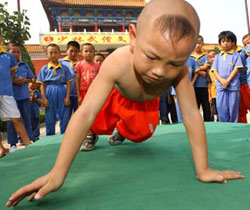|
“俯臥撐”怎么說?
[ 2006-08-22 10:13 ]

圖片上的小家伙日前人氣很旺,大家說這位“俯臥撐小子”簡直要挑戰(zhàn)吉尼斯記錄了。“俯臥撐小子”陸地今年六歲,是河南一所武術(shù)學(xué)校的學(xué)生。他的拿手絕活就是做俯臥撐,能在200分鐘內(nèi)一口氣做完10000個(gè)俯臥撐。
請(qǐng)看《中國日?qǐng)?bào)》相關(guān)的圖片說明:Lu Di, 6, doespushupsas other young kungfu students watch at a kungfu school in Central China's Henan Province July 26, 2006. According to school president Shi Yongdi, Lu did 10,000 pushups in three hours and twenty minutes four days ago. Since he shows so much promise, Shi says the school will waive his tuition for ten years.
報(bào)道中的pushup就是“俯臥撐”,顯然,pushup由動(dòng)詞詞組push up(增加,提高)演變而來,“up”不言而喻指“向上”。
這里順便再提幾個(gè)與up有關(guān)體育項(xiàng)目:sit-up指“仰臥起坐”,chin-up和pull-up指“引體向上”,而chin-up和pull-up的區(qū)別在于手握單杠的方式不同(見圖)。
最后,再介紹兩個(gè)有關(guān)push的俚語用法,get the push指“解雇”;而push drugs可用來形容
“販毒”。
(英語點(diǎn)津陳蓓編輯)
|